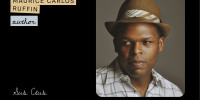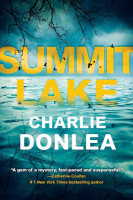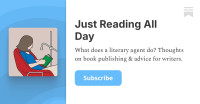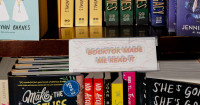
How to Write a Novella - With Paul Michael Anderson
litreactor.com – Thursday February 6, 2025

When the newly reformed LitReactor asked if I’d be interested in writing a how-to article on novellas, my knee-jerk answer (to myself) was: “How the hell should I know?” It’s a strange answer, one I should probably unpack with my therapist at some point, because — putting my own neuroses aside — I do know how to write them.
As of 2025, I’ve written five novellas: Bones Are Made To Be Broken, Standalone, How We Broke (with Bracken MacLeod), The Only Way Out Is Through, and You Can’t Save What Isn’t There — and only one of them was a whoopsie-daisy, didn’t see a novella there, son. With the other four, it was deliberate action; I wasn’t creating a short story or developing a novel, I was writing a novella, and I knew it.
On that note, allow me to show you how it’s done.

Have we reached peak imprint?
thebookseller.com – Thursday February 6, 2025

Imprints are great business, but is their prestige and value getting diluted as they proliferate?
For decades now, the ‘Big Five’ publishers have been swelling in size by amassing a huge number of imprints: names under which they publish that each focus on a specific genre, market or type of book. Some, such as Virago or Fourth Estate, used to be independent publishers, but many, such as Hachette’s Brazen Books or Penguin’s Fern Press, began within these larger organisations. The question is, does the industry have too many imprints and do they influence how readers behave?
A good place to start, perhaps, is with Penguin Random House, home to the largest collection of imprints in the UK. Its website states that the company owns "300 editorially and creatively independent publishing imprints... together, our imprints publish over 70,000 digital and 15,000 print titles annually, with more than 100,000 eBooks available worldwide".
Take a moment to process those numbers. In the UK, the average number of books a person reads each year is 10. Given the sheer scale of PRH’s operation, it’s not surprising that dividing itself up into imprints is helpful: they form an infrastructure that maintains variety in this behemoth company.

On Navigating 300 Rejections and Learning to Write Fearlessly with Maurice Carlos Ruffin
subclub.substack.com – Thursday February 6, 2025

Welcome to our interview series, On Something with Somebody! This week, Maurice Carlos Ruffin, author of The Ones Who Don’t Say They Love You, shares his thoughts on being a joyous and aggressive writer, the many rejections of his early career, celebrating with ice cream, and his submissions strategy.
"During a seven-year stretch, my work was rejected over 300 times by literary magazines. I had to accept that if I wanted to publish, I had to change both the work and my approach."
Kailey DelloRusso: When you were first starting out, how did you take rejection? And what did you learn from those first few rejections?
Maurice Carlos Ruffin: I didn't take it well. The first rejection I can recall was from my undergraduate literary magazine. Frankly, I was devastated. I stopped writing stories for about four years and stopped submitting for maybe six.
Later, I came back to writing and went to grad school. I still got rejected quite often. In fact, during a seven-year stretch, my work was rejected over 300 times by literary magazines. Fortunately, I can thank Stephen King's On Writing for giving me perspective and gumption. He was rejected, I think 200 times before the age of 18. He used to pin the rejection slips on the wall above his typewriter. How could I complain?
Ultimately, I had to accept that if I wanted to publish, I had to change both the work and my approach. I sharpened my stories and became more strategic about my submission strategy. Basically, I made the stories sound more like the place I'm from (my weird, wonderful New Orleans) and made them faster-paced and more emotionally charged. For submissions, I used Duotrope, which allowed me to figure out which high-quality magazines I had the best shot of being published by. I entered many contests and won three. As Biggie Smalls said, "I went from negative to positive."

Trying to write a novel? A Marrakech ‘book camp’ might unlock your literary skills
ft.com – Monday January 27, 2025

There’s nothing like shopping to form a bond between strangers. It was the glue for two women of letters who met at Lahore Literary Festival a few years ago. “We ended up hanging out, talking about books and shopping. There is a great picture of us in an old haveli. I remember your hair was bright blue, and a blue parrot settled on your shoulder,” says Bloomsbury editor Alexandra Pringle of her encounter with future creative partner, the writer and historian Alex von Tunzelmann. The blue hair is long gone, although von Tunzelmann has gone for purple ahead of their next writing masterclass.
Together with their mutual friend, editor and literary consultant Faiza Khan (Pringle had hired her to run the Bloomsbury list in Delhi), they talked of opening a boutique with a curation of goods and artefacts truffled from their travels. “We realised that our love of objects is founded in storytelling – I do believe everything holds a history and a life,” says Pringle, who lives on a houseboat in Chelsea filled with Staffordshire figures, fine porcelain and ancient finds from Morocco. The idea of a writing retreat then blossomed with the input of author and journalist Nesrine Malik, and, in 2022, Silk Road Slippers was founded.
There are myriad writing retreats out there, often staged in picturesque locales such as the south of France and largely attracting a certain tranche of middle-class England. This literary double act, however, was determined to establish a fully immersive workshop with hands-on exercises, seminars, one-on-one feedback and the central attraction of a guest author. The masterclasses held in Marrakech got underway in November 2023 with Shehan Karunatilaka as the first guest author. Esther Freud (23-28 February) and Alan Hollinghurst (2-7 March) are top billing for the upcoming spring masterclasses, which cost £3,200 per person (with a £1,000 deposit payable on acceptance).

Chicagoan Charlie Donlea on Writing Best-Selling Mysteries
classicchicagomagazine.com – Monday January 27, 2025

With titles like Don’t Believe It, Some Choose Darkness, and The Girl Who Was Taken, you know that you are in for a thriller where surprises lurk around every corner. No wonder Chicagoan Charlie Donlea is a USA Today and a number one best selling author internationally. Along with a Charlie Donlea mystery to get me through this week’s artic cold I added a further stay-at-home pleasure of speaking with the Chicago best-selling author himself about his craft.
Writing the manuscript for his tenth thriller is keeping Donlea indoors this week as well as working with a team to develop his Twenty Years Later into a television series. He may will have news to share soon. His newest hardcover Guess Again will be released in August 2025.
Not only do we love the plot twists that keep you guessing until the final pages, the clever red herrings we fall for and the great destinations where Donlea’s novels are set (including Chicago and Door County as well as faraway places like St. Lucia) we find characters you care for, something lacking in many mysteries.
Here’s what we learned from Donlea on a day when it was two degrees in Chicago.

Why do editors 'ghost'
bukiebooks.substack.com – Saturday January 25, 2025

I saw some recent discourse about this on the Substack app, but it’s been a topic of heated conversation within publishing, between writers and agents, and between agents and editors for the past few years. Some of you may recall Jonathan Karp’s infamous mandate that editors must respond to agent submissions within a month1, after he learned about ghosting.
In the past few years, there have been more instances of editors simply not responding to submissions from agents. They will respond to the pitch, but after receiving the manuscript, neither reject nor ask for a call, even after multiple follow-ups and sometimes even after calls and auction rules are set.
If you are an editor I work with who follows me here, this isn’t about you. You are all perfect. Also, thanks!
Why is this happening?

Publishers and Authors Wonder: Can Anything Replace BookTok?
nytimes.com – Friday January 17, 2025

With a ban looming, publishers are hoping to pivot to new platforms, but readers fear their community of book lovers will never be the same.
Two years ago, Jeneane O’Riley self-published her fantasy romance novel, “How Does it Feel?,” an enemies-to-lovers tale about a woman who meets a handsome, unhinged fairy prince. Without a publisher to help market her novel or get it into bookstores, she decided to promote it herself on TikTok.
Pretty soon, TikTok users started posting their own viral reactions to the book, and sales shot up. One post from a reader shocked by the novel’s plot twists got more than six million views. The book hit No. 1 on Amazon.
“That type of free marketing for a small, independent author is unheard-of,” said O’Riley, who later signed a deal with Bloom Books, a romance imprint at Sourcebooks.
Now, with a law banning TikTok in the United States set to take effect on Sunday, O’Riley and other authors are scrambling to keep their networks of fans intact. O’Riley, who has more than 52,000 followers on TikTok, has been urging people to find her on Instagram, Threads and Facebook. But she’s concerned that her close-knit TikTok audience will disperse.

How To Know If Your Idea Is a Novel or a Screenplay, and Why Thrillers Make Great TV
crimereads.com – Wednesday January 15, 2025

I’m a TV writer by profession, and when I’m not staffing a show, I develop TV series adaptations with the goal of selling one to a buyer. My favorite novel genres to adapt are mysteries and thrillers because I love suspenseful, propulsive storytelling and because thrillers make damn good TV.
TV shows demand action and surprises that compel a viewer to keep watching, and since suspense novels are built around twists, with chapters that end on cliffhangers, they lend well to adaptation. In the Age of Streaming, where thousands of TV shows across 400 networks compete for attention, it’s incredibly difficult for a series to gain traction, but a delicious thriller can quickly amass an audience.
If I spark to a novel, I develop my “take”—a 20-minute pitch on how I would adapt the book into an on-going series. When pitching a series, the most important question I need to answer is Why Now? A thriller novel with a strong hook and a juicy twist is great, but one that has something to say, that sparks discussion around a timely, compelling theme, is undeniable. Think Big Little Lies, with its examination of domestic violence among the elites, or Codename Villanelle (the source material for Killing Eve), with its rare depiction of female obsession.

What's next for kids' books
thebookseller.com – Sunday January 12, 2025

As we look ahead into 2025, the ongoing realities of global instability and economic uncertainty are not going away any time soon. Adaptation will be essential as we navigate these persistent issues, demanding resilience and innovative solutions from individuals and communities alike.
In the creative realm, we are witnessing a significant shift toward authenticity. There is an increasing desire among audiences to trust the true identities of those who created the work – writers, artists, illustrators and actors.
In a time where digital imagery and AI often raise questions such as: is that real, did it actually happen or is it fake? The importance of knowing the voices behind the work becomes paramount. As a result, we can anticipate a celebration of transparency and trust in creative expression. What that means is a striving towards building an artist’s name, audience and credibility to own the copyright so they can be recognised as the original creator of their work across all platforms.
In today’s screen-filled world, we are not just selling books, we are promoting the act of reading itself. We advocate for its transformative power in shaping young minds, fostering empathy and enhancing mental health. This is a responsibility we cannot take lightly. It is one that requires all the creativity and collaboration between agents and publishers to create new formats with retailers who are confident in how to sell these non-traditional formats.
We need to get bold. We need to push the boundaries of what a book can be. Here is how I think this might look in the year to come.

8 Newsletters Demystifying the Publishing Industry
electricliterature.com – Monday January 6, 2025

The publishing industry can feel like an opaque, black box to aspiring authors, with countless gatekeepers—agents, editors, publicists, book buyers and more—shaping the process behind the scenes. Even established authors can find the sector confusing as they attempt to read the tea leaves behind changing advance sizes, varying levels of publicity support and shifting print run amounts.
Fortunately, there are now dozens of newsletters that aim to demystify the publishing business. I’ve been fortunate enough to have found many of them through my book recommendation newsletter, What To Read If, and now love seeing their names pop up in my email. (Given the state of my inbox, this is the ultimate compliment.)
From publishers and publicists to authors and reviewers, the eight newsletters below provide valuable insights and analysis to anyone looking to get smarter about—or to survive in—the publishing world.
Get the free newsletter | Submit a news item or article | Get Writers' News for your website





